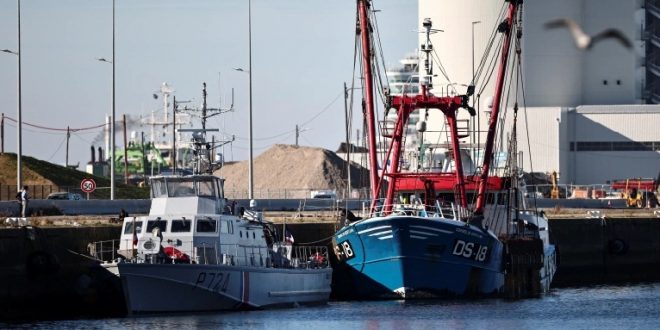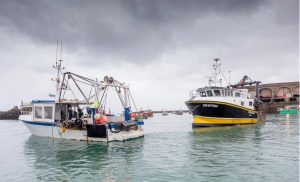28-10-2021
PARIS/ LONDON: France has seized one British trawler for operating in its territorial waters without a licence and fined another as a bitter dispute with the United Kingdom over post-Brexit access to fishing grounds escalates.
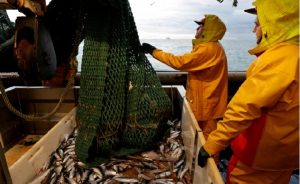 The French maritime ministry said the ships were cautioned during checks by maritime police on fishing vessels off the northern port of Le Havre overnight on Wednesday, hours after Paris warned it needed to “speak the language of strength” with London amid the smouldering row and warned of impending sanctions.
The French maritime ministry said the ships were cautioned during checks by maritime police on fishing vessels off the northern port of Le Havre overnight on Wednesday, hours after Paris warned it needed to “speak the language of strength” with London amid the smouldering row and warned of impending sanctions.
The seized trawler, now under the control of French judicial authorities, did not have proof it was allowed to fish in French waters, the maritime ministry said.
It was subsequently rerouted to Le Havre and was tied up at the port’s quayside. The boat’s captain could now face criminal charges and its catch may be confiscated.
The other boat was fined for initially resisting a check by the maritime police.
British Interior Minister Priti Patel described the seizure as “disappointing” as Environment Minister George Eustice called for calm.
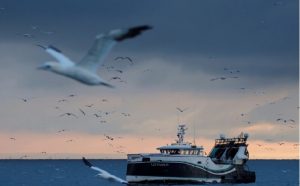 Eustice told the British Parliament that he had spoken to European Union Commissioner Virginijus Sinkevicius and stressed it was important to “de-escalate” the situation.
Eustice told the British Parliament that he had spoken to European Union Commissioner Virginijus Sinkevicius and stressed it was important to “de-escalate” the situation.
The incidents came after France threatened to take retaliatory measures from next week over what it says is the UK’s refusal to grant its fishermen the full number of licences to operate inside British waters that Paris claims is warranted.
The UK and the Channel Island of Jersey last month denied dozens of French trawlers the right to fish in their territorial waters, saying they did not supply evidence to support their applications to do so.
France says the restrictions are contrary to the post-Brexit agreement that London signed in December 2020, eleven months after it formally left the EU on January 31 last year.
Negotiations between the UK and the European Commission, the European Union’s executive arm, over the fishing rights dispute are ongoing.
After weeks of talks, UK authorities have issued more licences but the number still accounts only for 50 percent of what France believes it “is entitled to”, French government spokesman Gabriel Attal said on Wednesday.
Attal’s remarks came as the French ministers for Europe and for maritime affairs said in a joint statement on Wednesday that Paris will bar UK fishing boats from designated ports and impose extra customs checks on British goods entering France from November 2 unless an acceptable agreement is reached before then.
That raises the prospect of more economic pain before Christmas for the UK, which is currently facing labour shortages and rising energy prices.
Paris is also reviewing a second round of sanctions which “doesn’t exclude” measures that would target energy supplies to the UK.
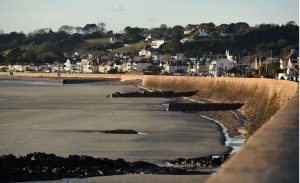 European Affairs Minister Clement Beaune told news channel CNews France needed to “speak the language of strength since that seems to be the only thing this British government understands” but the UK has defended its stance, with officials saying that fishing licences have been issued to vessels able to show a track record of operating in its waters in the years prior to its withdrawal from the EU.
European Affairs Minister Clement Beaune told news channel CNews France needed to “speak the language of strength since that seems to be the only thing this British government understands” but the UK has defended its stance, with officials saying that fishing licences have been issued to vessels able to show a track record of operating in its waters in the years prior to its withdrawal from the EU.
A government spokesperson said on Thursday that France’s threatened actions “do not appear to be compatible” with the UK-EU Brexit withdrawal agreement “and wider international law”, before warning they will be met with an appropriate and calibrated response if carried through.
“France’s threats are disappointing and disproportionate and not what we would expect from a close ally and partner,” the spokesperson said.
Andrew Simmons, reporting from London, said the dispute appeared to be heading towards further “escalation”.
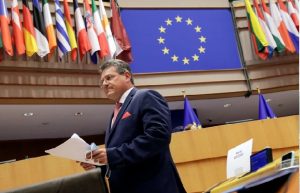 “It’s unclear how this will be resolved, because the threats are going in a very serious direction,” Simmons said.
“It’s unclear how this will be resolved, because the threats are going in a very serious direction,” Simmons said.
“This is a time of real tension between France and Britain over a raft of issues,” he added, citing the row that erupted in the wake of the announcement of the AUKUS security pact between the UK, the United States and Australia.
The trilateral agreement for the Indo-Pacific region led to Australia scrapping a multibillion-dollar deal with France to build conventional submarines.
It will instead acquire at least eight nuclear-powered submarines with US and British technology. (Int’l News Desk)
 Pressmediaofindia
Pressmediaofindia
